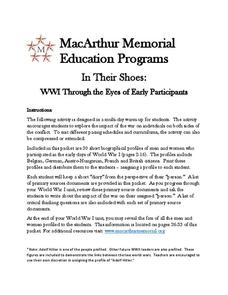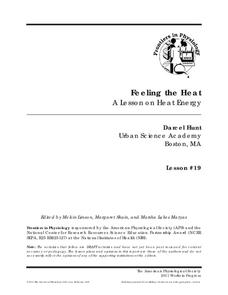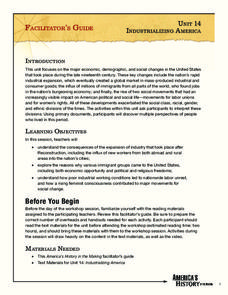Curated OER
Ending Apartheid
Students analyze how the roles are changing for women in South Africa. Using the internet, they research famous women from around the world who helped advance a women's place in society. They create a storybook about their famous...
Curated OER
Puppet Show
Students explore politics by defining several jobs in the government. For this House of Representatives lesson, students identify several important roles men and women have in the House as well as the Senate. Students identify what it is...
American Physiological Society
Drug the Water Flea
This is a flea. This is a flea on drugs. Any questions? Your class will have questions aplenty during an impactful experiment. Lab groups get to know Daphnia magna, the humble water flea, and study the effects of stimulants and...
American Physiological Society
Hoo Eats Who and What is What in Your Own Backyard?
Bird is the word! Teach life science scholars the importance of our feathered friends and the roles they play in our ecosystem. Using the plan, learners investigate the birds in their areas, determine the biotic and abiotic factors that...
American Physiological Society
Sticky Adaptations A Lesson on Natural Selection
Now you see it, now you don't! The stick bug exhibits the ability to disappear into a wooded environment. Why does this adaptation manifest in some species, but not in others? Life science students explore animal adaptations in nature...
American Physiological Society
Effects of Environment on Enzymes
Much like the tale of Humpty Dumpty, proteins, once altered, will never be the same again. Honors and pre-AP biology classes explore the delicate world of enzymes via a Webquest and lab experiment. The teacher's guide contains all...
MacArthur Memorial
In Their Shoes: WWI Through the Eyes of Early Participants
Several social activities provide showcase the perspective of many prominent figures in World War I history. Students read an assigned case study about a memorable person and complete several activities to further understand this...
Indiana University
World Literature: "One Evening in the Rainy Season" Shi Zhecun
Did you know that modern Chinese literature “grew from the psychoanalytical theory of Sigmund Freud”? Designed for a world literature class, seniors are introduced to “One Evening in the Rainy Season,” Shi Zhecun’s stream of...
American Physiological Society
Thermal Insulators: Keep it Hot!
There's nothing like a cup of hot chocolate on a chilly winter's day. Except for when that hot chocolate quickly becomes lukewarm chocolate ... or even cold chocolate. What material provides the best insulation to keep the chocolate from...
American Physiological Society
Did I Observe it or Infer it?
Take the mystery out of inquiry! When young scientists learn to use their keen powers of observation to make smart inferences about a situation, they are well on their way to understanding what the scientific method is all about. Using...
American Physiological Society
It’s the Heart of the Matter
Get the class jumping for joy with a fascinating look at matters of the heart. Learners perform physical tasks, collect and analyze heart rate data, and study conditions that affect heart health. Use the action-packed lesson plan to...
American Physiological Society
What Environmental Conditions Lead to the Hatching of Brine Shrimp?
Will changing the environment in which brine shrimp live impact their reproductive success? Young scientists get hands-on experience studying the habitat of brine shrimp in a two-week immersion instructional activity. The teacher's guide...
American Physiological Society
How Does the Density of a Liquid Affect the Buoyancy of an Object?
Here's a lesson plan that will really float your boat! Introduce physical science scholars to the relationship between buoyancy and density through an assortment of individual and collaborative exercises. Lab groups work together to...
American Physiological Society
Why is Kettle Corn Cooked in Copper Pots?
The kitchen — it's not just for eating anymore! Specific heat is often a difficult concept to grasp, so give it context by relating it to cooking. Learners gain experience in the principles of thermal energy transfer by designing an...
American Physiological Society
Sit On It
How do product designers come up with the variety of things we see in stores and on TV every day? They identify a need, then create something that meets that need. Sounds simple, right? A two-week lesson puts seventh graders in that role...
American Physiological Society
Feeling the Heat
How do the changing seasons affect the homes where we live? This question is at the forefront of engineering and design projects. Challenge your physical science class to step into the role of an architect to build a model home capable...
Curated OER
Jazz in America Lesson Plan 8
Students explore the present and juture of jazz. They identify terms associated with jazz and listen to contemporary recordings. They participate in a class discussion regarding jazz's contribution to and reflection of American culture...
Curated OER
Slavery's Opponents and Defenders
High schoolers explore the wide-ranging debate over American slavery and the lives of its leading opponents and defenders and the views they held about America's "peculiar institution."
Agriculture in the Classroom
Growing a Nation (1950-1969): Prosperity & Challenges: The Story of American Agriculture
A wonderful lesson plan on the development and impact of mechanized farming! History or agriculture classes learn the historical background of the United States' food production by creating a pamphlet with information on the cause and...
Prestwick House
A Raisin in the Sun
Or does it explode? Discuss the ultimate deferred dream in Lorraine Hansberry's A Raisin in the Sun with a handy crossword puzzle that reviews key names and details from the play.
Annenberg Foundation
Industrializing America
Imagine an eight year old spindle boy working barefoot in a factory in the late 1800s. Scholars research the industrial period in American history in the 14th lesson of a 22-part series that explores the country's background. Groups...
Curated OER
“Everyone Else Does It!” Ethics Project
Do you have good ethics? How about good morals? Scholars investigate the role business ethics, morals, and values play in society. Through role play, group work, and readings, they uncover the basis behind the importance of being...
Jamestown-Yorktown Foundation
Why Did Some Colonial Virginians Seek Independence?
To understand the reasonings of those colonials who sought independence from England, young historians are divided into content groups that examine documents related to either the Boston Tea Party, the Yorktown Tea Party, Tea Overboard,...
Syracuse University
American Industrial Revolution
While the Industrial Revolution may have fueled America's rise to the top of world markets, the child laborers often faced dangerous conditions. Using primary source images and other information, scholars consider what these children...

























